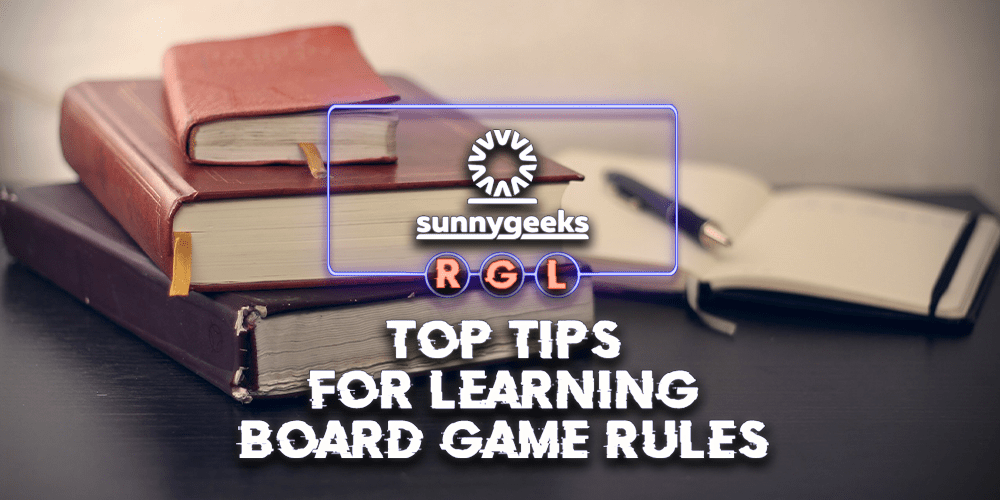Rules – famously, you can’t have fun without a few of them.
The backbone to your board game night, nailing your rules instruction is one thing, but making them stick in your head is another. Whether you’re struggling to understand niggly rules like Carcassonne’s farmers, the nuances of boats in Game of Thrones, or figuring out how scoring works in Arboretum.
So here are five of our top tips for internalizing the most complex of rules before your next session.
Let’s be blunt. Learning to play in the back of a taxi on the way to the train station is not exactly the best way to give yourself a chance to learn how Food Chain Magnate works. Learning game rules is like any other skill, you’ll need a space to work, time set aside, and enough energy and focus to see things through. That means being fed, watered, and chilled out enough to give the game the attention that it needs.
While this may sound boring (and listen, we respect your intelligence, it absolutely is) it can massively cut down the amount of effort required to internalize rules and help them stick. This can even, dare we say it, be relaxing as you have to take time to yourself to carefully read instructions, browse videos, and in the case of Martin Wallace games, one of those corkboards with loads of red string and polaroids.
If something isn’t sticking, you need to stop messing about with the glue and take a good look at the surface. Educators have discovered that there are four different kinds of learners and following the wrong approach for your distinct ‘type’ can leave you frustrated or expending an immense amount of energy and stress to make things lodge away permanently. These involve: visual learners, auditory learners, kinaesthetic learners, and reading/writing learners. Taking time to reflect on your own approach can really help you squirrel away tough rulebooks and there are a number of tests available online that can help you find out which box you fall into. Once you figure this out you can road-test and refine an option that works for you.
For example, visual learners and auditory learners can check out rules instructions from experts like Rodney Smith at Watch it Played. Video can help you rewind or pause instructions in a way that would be impossible (or intimidating) in person. Kinaesthetic fans are often best served by physically breaking out the game and acting out practice turns and putting rules into effect. And read/writers can just break out the rulebook and a cup of coffee while intermittently shoving their cat off the instructions.
In addition to getting to grips with how you learn, it’s also good to build knowledge about how to learn in an organized way. For example: imagine the average game night. You’ll have your gorgeous gaming table all set out, food and drinks ready, and three games set aside. But maybe your numbers change, or a player hates one of the picks, or someone managed to snag an OOP copy of a classic that you have to play. Being able to learn at speed and with a minimum of effort is a valuable life skill. And all it requires is a little structure.
When it comes to gaming rules, you want to acquire a high, generic, and targeted understanding of the rules. At the high level it’s worth knowing the game’s genre, how you win, and some of the elements or kinks that make it stand out or are unique to itself. Once that’s captured, it’s time to look at the rules – specifically what a turn looks like and the options available to each player on their turn. It’s also helpful here to understand how your actions can potentially impact other players and when they shove up against you, what options you have to respond. And, finally, it’s worth looking at the ‘bitty’ rules that can trip you up if you’re not aware of them. These can include common errors, specific skills, or anything in-between.
If you’re still struggling to make head-or-tail of the rules, there’s no shame in having someone sit with you and literally walk through the process. And in an age of Covid, that professional is the gloriously named Richard Ham. Operating under the alias of Rahdo, Ham has solo played through hundreds of games solo to provide one of the most in-depth reviews available online. These include goliaths like Mage Knight and Through the Ages to cutting-edge releases like Dune Imperium.
These can be a fantastic way to build your high-level understanding of a game, tackle issues around turn order, or refresh your memory if you’ve forgotten how to (metaphorically) put one foot in front of the other. Sites like SUSD hold regular live-play sessions on platforms like Twitch and even now sadly defunct sites like Tabletop offer end-to-end play sessions that can allow your learning to move from abstraction to real-world examples. And if you’re still grappling with getting your head around sticky edge-cases or rules conflicts, you’ll be far from alone. Taking yourself to the BGG Forums or the Boardgames subreddit can help you find a solution to your problems in no time at all.
Look, we don’t know what else to tell you – just get someone else to do the hard work for you.
In addition to the site forums, Boardgamegeek is a vast repository of cheat sheets, rules summaries, and player aids. Running off a few copies for yourself and other players can help your recall when you’re in a session and take the pressure off you when you’re trying to internalise a bunch of instructions ten minutes before people arrive at your door. These can also be picked up at publisher sites, letting you get a great looking bunch of crib notes to make learning games quick and simple.
If you’re still struggling to get the rules right, it’s time to do the unthinkable – take the rules, place them in their box, place that box on the shelf, and go for a jog. Some games are notoriously hard to understand no matter how much you throw yourself at them and taking a break or just stopping entirely can just be the best course of action. Send a group text your group and let your friends know you’re struggling and see if it’s ok for you to learn ‘on the night’. Remember – it’s perfectly acceptable to say that you’re too stressed, tired, or frankly unable to understand the byzantine series of clauses, subclauses, and addendums that can make up a modern rulebook.




